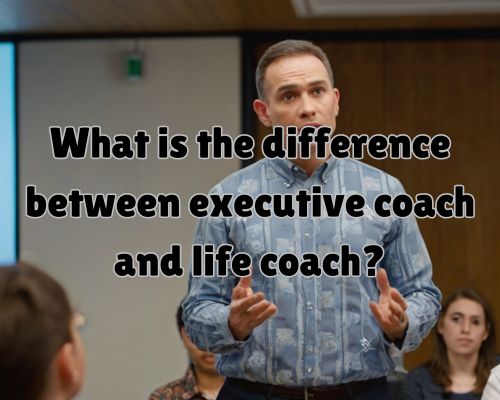What is the Difference Between Executive Coach and Life Coach? Understanding Key Distinctions

What is the Difference Between Executive Coach and Life Coach? Understanding Key Distinctions
If you’ve ever wondered about the differences between executive coaching and life coaching, you’re not alone. These two types of coaching share some core elements, such as active listening and fostering self-awareness.
However, they also have significant differences in their focus and setting, making them suited to different needs. Executive coaching emphasizes enhancing professional skills and boosting workplace performance. This aligns with career advancement and leadership development.

Life coaching, on the other hand, centers on personal growth. It aims to improve aspects of your everyday life and relationships. Whether you are looking to overcome personal obstacles, achieve a better work-life balance, or find greater fulfillment, life coaching might be your path.
The main difference between the two lies in their primary objectives: professional success versus personal fulfillment.
Understanding these differences can help you determine which path best suits your current goals. Whether you’re climbing the corporate ladder or seeking better relationships, knowing what each type of coaching offers can guide you toward making an informed decision about investing in your personal or professional development journey.
Defining Executive and Life Coaching
“Executive and life coaching are distinct fields that cater to different aspects of an individual’s journey. While executive coaching focuses on professional and leadership growth, life coaching addresses personal development and well-being.” said Gines Satchi of Make It Happen Coaching.
What is Executive Coaching?
Executive coaching centers on enhancing professional life and honing leadership skills. It is aimed at individuals in corporate roles who are seeking professional development to climb the career ladder.
Core competencies such as strategic thinking, decision-making, and emotional intelligence are often the focus. Training programs might include leadership development and developing effective action plans.
An executive coach partners with clients to identify strengths and areas for improvement to boost professional growth.
This type of coaching can be instrumental in enriching leadership qualities, promoting goal-oriented strategies, and fostering a forward-thinking mindset. Through this process, you gain insights into achieving success within your organizational context.
What is Life Coaching?
Life coaching deals primarily with personal life aspects, concentrating on personal development and well-being. It encourages you to explore your values and what truly matters to you.
The process involves setting personal goals such as improving work-life balance or pursuing personal growth. A life coach supports you in identifying hurdles and developing strategies to overcome them.
This coaching style is transformative, aiming at enhancing your quality of life. By building self-awareness and inspiring empowerment, life coaching helps you live in alignment with your values and aspirations, leading to a more fulfilling life.
Coaching Methodologies and Outcomes
Executive and life coaching both aim to enhance individuals’ potential and effectiveness, yet they rely on distinct methodologies and target different outcomes. The focal points include strategic thinking and performance for executive coaching, while life coaching hones in on personal development and wellness.
Executive Coaching Strategies
Executive coaching focuses heavily on improving workplace performance and productivity. As an executive coach, you employ tools such as assessments and feedback to identify areas for growth.
Effective communication, strategic thinking, and improved decision-making are central. Your role involves developing action plans that bolster leadership skills, goal setting, and accountability.
You work on enhancing influence and self-awareness, contributing to a client’s professional edge. Listening skills are crucial, allowing you to tailor your approach to specific needs and create relevant action planning. Through mentoring and motivation, executive coaches enhance leadership capabilities.
Life Coaching Techniques
When it comes to life coaching, the emphasis shifts to personal development and holistic well-being. Utilizing tools that boost self-confidence and self-awareness, you focus on achieving wellness coaching goals.
Effective communication and relationship-building are key, allowing you to support clients in various life aspects. Your approach may include developing personalized goal-setting techniques and enhancing motivation to drive change.
Life coaches often use techniques like visualization and affirmations to encourage clients toward a positive mindset. Creating action plans in life coaching involves balancing multiple life domains, ensuring the achievement of personal goals.
For more coaching information, you may see Gines Satchi of Make It Happen Coaching.
Measuring Success in Coaching
Success in coaching is measured through a mix of qualitative and quantitative methodologies.
Setting clear, measurable objectives at the outset helps evaluate progress.
For executive coaching, improvements in workplace performance and leadership skills are key success indicators.
Metrics could include productivity improvements, better decision-making, and enhanced communication.
In life coaching, measuring success involves assessing the client’s overall sense of well-being and fulfillment.
Tracking progress towards personalized goals helps ensure that clients achieve desired outcomes.
Regular feedback sessions and assessments enable both life and executive coaches to refine their strategies.
This ensures continued growth and achieving coaching objectives.

